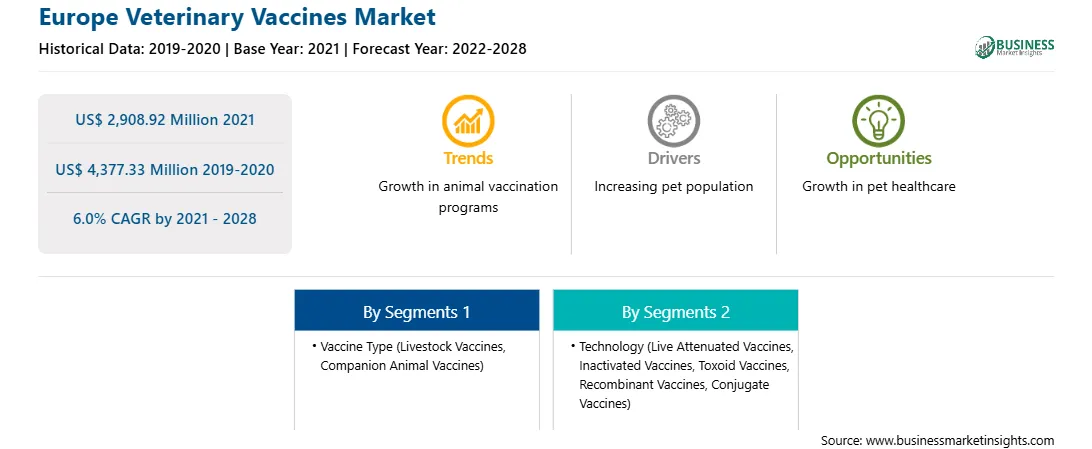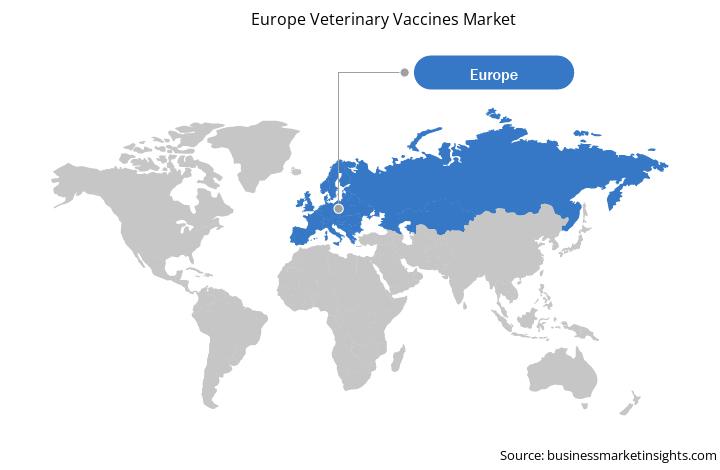Market Introduction
The Europe veterinary vaccines market includes the consolidated markets for Germany, France, Italy, Spain, United Kingdom, and Rest of Europe. Germany held the largest share of the market in 2021. The growth of German veterinary vaccines market is driven by factors such as increase in the companion animal population, rising incidence of zoonotic diseases, initiatives by various government agencies and animal associations to sustain animal health. In Germany, Federal Ministry of Food and Agriculture safeguards the animal health by legislation and the veterinary administration. As animal diseases do not stop at national borders, the Federal Ministry works continuously with the veterinary authorities of other Member States and third countries. The Federal Ministry provides information on animal diseases such as swine fever. Germany is currently driven by certain factors, like the stern government regulations related to veterinary health and the high expendable income of the German people causing increased interest in the farm animals and companion animals. The government made vaccination mandatory for farm animals. This government mandate has a great impact on the market studied in Germany, as the country has a huge number of farm animals. Rising awareness among the German population about the significance of both companion and farm animals’ health is the factor responsible for the growth of farm animal healthcare products segment, particularly anti-infective agents, parasiticides, and medicinal feed additives. Rising incidences of zoonotic diseases and increasing prevalence of foodborne diseases and infections are the major factor driving the growth of the Europe veterinary vaccines market.
In case of COVID-19, Europe is highly affected specially the UK. The infection curve has been fluctuating and going from bad to worse. It hits a plateau for quite some time and then again shows fluctuations, with infection levels going up and down. This is irrespective of the fact that the countries that make up Europe vary significantly in size, population, available natural resources, economy as well as political stability. The countries in Europe are highly affected due to the COVID-19 pandemic. To control the outbreak of virus various restrictions were imposed by the government. This led to disruption, limitation, challenges, and changes in each sector of every industry. Likewise, animal vaccines industry was also impacted by the pandemic. For instance, veterinary organizations overseas have recommended limiting animal patient care to acutely ill animals and emergencies. Furthermore, the lockdowns have led to rescheduling of annual checkup exams and elective vaccination procedures. However, various key players have ensured the supply of animal vaccines as the governmental institutions across the globe are taking strict measures to maintain the supply to avoid zoonotic viruses from spreading into communities. However, the overall impact of COVID-19 on the animal vaccines market remains fairly negative, owing to fall in demand as veterinary visits are limited, and animal healthcare approach is changed to providing care to emergency cases and critically ill animals.
Market Overview and Dynamics
The Europe veterinary vaccines market is expected to grow from US$ 2,908.92 million in 2021 to US$ 4,377.33 million by 2028; it is estimated to grow at a CAGR of 6.0% from 2021 to 2028. Animal-borne diseases can pose a high risk to public health and can be detrimental to businesses and economies. Therefore, farmers and governments take various precautions, such as maintaining clean animal stalls and animal vaccinations, to prevent disease outbreaks. Influenza, one of the most prevalent infectious diseases, is a highly contagious airborne disease that appears as an acute febrile sickness with variable degrees of systemic symptoms ranging from mild fatigue to respiratory failure and death during seasonal epidemics. Infectious illnesses of pets and farm animals are a substantial danger to animal health and welfare. Effective control is critical for agricultural health, national and international food security, and poverty alleviation in several countries. Various cattle illnesses are endemic in numerous places across the region. Existing and novel pathogen threats continue to emerge due to climate change, agricultural practices, and demographics, all of which favor the spread of arthropod-borne diseases to new geographical areas. Zoonotic illnesses are rising and offering a new serious threat to human health. They can be transmitted directly or indirectly between animals and humans. The new influenza A (H1N1) virus's pandemic status is a recent example of the threat posed by zoonotic viruses. The incidence of the vector-borne disease has grown considerably over the last decade, corroborating the hypothesis that climate change is causing the formation of conditions in which arthropod vectors are environmentally sensitive. The growth of new infectious illnesses has been tremendous in tropical places (EIDs). While zoonotic emerging infectious disease (EIDs) are associated with biodiversity in wildlife, those associated with the emergence of new drug-resistant strains are associated with agronomic factors such as antibiotic use and population density. Controlling numerous essential animal diseases continues to make progress, and procedures are now in place to combine critical scientific competence with political resolve to succeed. The first step of defense for many acute diseases is to employ cutting-edge diagnostic and surveillance techniques to establish a network of information about their spread and risk assessment. They are combined with efficient vaccine techniques for controlling important farm animal infections, particularly tests, and a continuous pipeline of new and improved vaccines that give long-lasting and durable protective immunity and are effective against many strains or variants. So, rising awareness related to diagnosis and treatment of infectious diseases is expected to drive the Europe market growth.
Key Market Segments
In terms of vaccine type, the livestock vaccines segment accounted for the largest share of the Europe veterinary vaccines market in 2020. In terms of technology, the live attenuated vaccines segment held a larger market share of the Europe veterinary vaccines market in 2020.
Major Sources and Companies Listed
A few major primary and secondary sources referred to for preparing this report on the Europe veterinary vaccines market are company websites, annual reports, financial reports, national government documents, and statistical database, among others. Major companies listed in the report are BIOVAC; Boehringer Ingelheim International GmbH; Ceva; Elanco; Hester Biosciences Limited; HIPRA; Merck & Co., Inc.; NEOGEN Corporation; Virbac; and Zoetis Inc. among others.
Reasons to buy report
Europe Veterinary Vaccines Market Segmentation
Europe Veterinary Vaccines Market - By Vaccine Type
Europe Veterinary Vaccines Market - By
Technology
Europe Veterinary Vaccines Market - By Country
Europe Veterinary Vaccines Market - Company Profiles
Strategic insights for the Europe Veterinary Vaccines provides data-driven analysis of the industry landscape, including current trends, key players, and regional nuances. These insights offer actionable recommendations, enabling readers to differentiate themselves from competitors by identifying untapped segments or developing unique value propositions. Leveraging data analytics, these insights help industry players anticipate the market shifts, whether investors, manufacturers, or other stakeholders. A future-oriented perspective is essential, helping stakeholders anticipate market shifts and position themselves for long-term success in this dynamic region. Ultimately, effective strategic insights empower readers to make informed decisions that drive profitability and achieve their business objectives within the market.

| Report Attribute | Details |
|---|---|
| Market size in 2021 | US$ 2,908.92 Million |
| Market Size by 2028 | US$ 4,377.33 Million |
| CAGR (2021 - 2028) | 6.0% |
| Historical Data | 2019-2020 |
| Forecast period | 2022-2028 |
| Segments Covered |
By Vaccine Type
|
| Regions and Countries Covered | Europe
|
| Market leaders and key company profiles |
|
The geographic scope of the Europe Veterinary Vaccines refers to the specific areas in which a business operates and competes. Understanding local distinctions, such as diverse consumer preferences (e.g., demand for specific plug types or battery backup durations), varying economic conditions, and regulatory environments, is crucial for tailoring strategies to specific markets. Businesses can expand their reach by identifying underserved areas or adapting their offerings to meet local demands. A clear market focus allows for more effective resource allocation, targeted marketing campaigns, and better positioning against local competitors, ultimately driving growth in those targeted areas.

The Europe Veterinary Vaccines Market is valued at US$ 2,908.92 Million in 2021, it is projected to reach US$ 4,377.33 Million by 2028.
As per our report Europe Veterinary Vaccines Market, the market size is valued at US$ 2,908.92 Million in 2021, projecting it to reach US$ 4,377.33 Million by 2028. This translates to a CAGR of approximately 6.0% during the forecast period.
The Europe Veterinary Vaccines Market report typically cover these key segments-
The historic period, base year, and forecast period can vary slightly depending on the specific market research report. However, for the Europe Veterinary Vaccines Market report:
The Europe Veterinary Vaccines Market is populated by several key players, each contributing to its growth and innovation. Some of the major players include:
The Europe Veterinary Vaccines Market report is valuable for diverse stakeholders, including:
Essentially, anyone involved in or considering involvement in the Europe Veterinary Vaccines Market value chain can benefit from the information contained in a comprehensive market report.